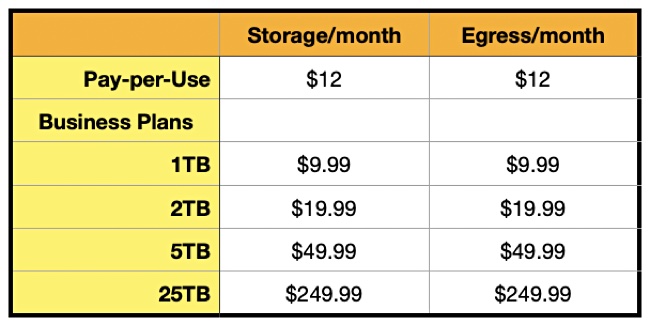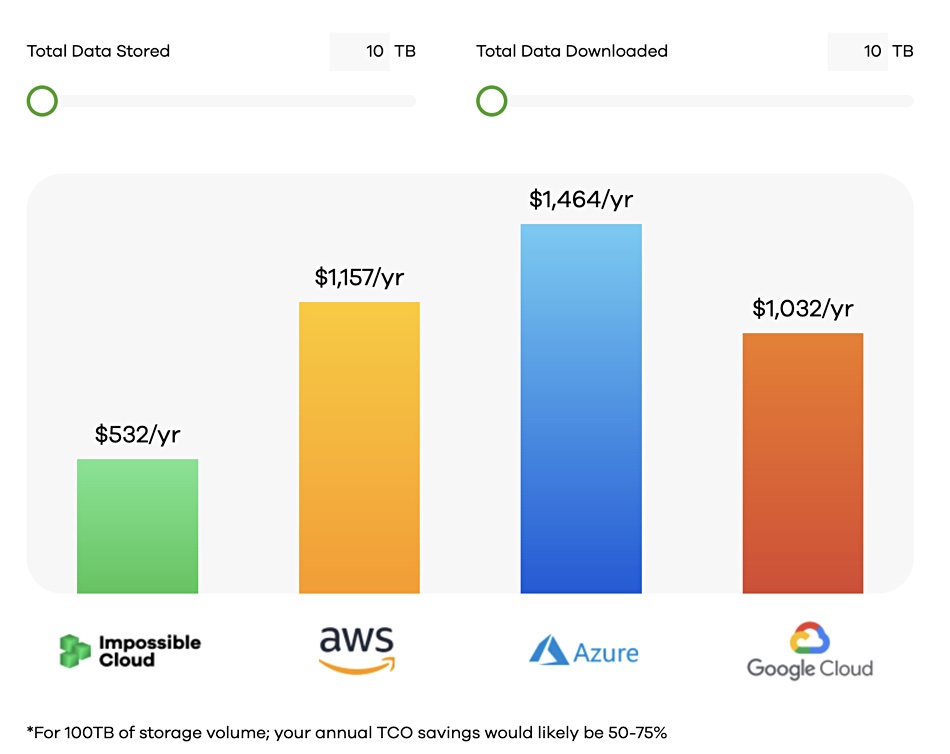German startup Impossible Cloud says it wants to bridge the traditional and Web3 storage worlds with its generally available, decentralized product – paid for in real money, not cryptocurrency – which uses spare capacity in enterprise datacenters instead of private computer owners.
Updates. Impossible Cloud has changed its pricing. 20 April 2023. Egress policy and discount info’ added. 12 May 2023.
Web3 or decentralized storage stores data across myriad IT systems and not in a single datacenter. A distributed network of private or very small business IT shops contribute spare storage capacity on a peer-to-peer basis using a shared protocol that handles the storage I/O, verifies their existence and trustworthiness using blockchain transactions, and incentivizes them via cryptocurrency payments. Consumers buy capacity the same way unless a translation mechanism exists to convert their dollars, euros or pounds to cryptocurrency.
Impossible Cloud wants to make its decentralized storage enterprise class and consumable using traditional currency.
CEO and co-founder Kai Wawrzinek said: “Our ultimate goal is to create a decentralized, cost-effective, enterprise-grade cloud platform that will revolutionize the way businesses utilize cloud services, providing enhanced efficiency, elasticity, and security.
Co-founder and COO Christian Kaul added: “Businesses of all sizes, including global corporations, have been largely ignored in the push to Web3. Our solution delivers all the benefits of Web3, but without the technical complexity that has held back mainstream business adoption. This solution is designed to unlock the B2B potential of Web3 and has never been more timely, as traditional cloud providers continue to raise pricing while underperforming in their delivery.”

Impossible Cloud’s founders wanted to improve on AWS, Azure and GCP cloud storage services. Wawrzinek said: “Cloud services have quickly disrupted countless industries, but today’s systems have already become ‘legacy’ and are riddled with limitations. We’ve reimagined what cloud storage can do and the value it delivers, accomplishing what many considered impossible.”
The Impossible Cloud storage service is a version of object storage that is S3 and object lock-compliant. It provides capacity through deals with enterprise-grade datacenters that are fully compliant with standards such as ISO27000, SOC 2 Type II, and others.
The company says its storage is designed especially for enterprises and SMBs that utilize centralized public cloud providers, such as AWS S3, as well as on-premises private clouds. As it uses enterprise-class datacenters, it says it offers better storage than other Web3 capacity providers, with lower latency, millisecond-class throughput speeds with rapid uploads and downloads. The system is designed for 100 percent durability and 99.95 percent availability.
It supports identity and access management (IAM) features, versioning for files (stored as objects), encryption and immutable buckets – the object lock feature.
It has been developed for deployment within minutes with a single line of code and features 24/7 engineering support.
Pricing
Prices according to its website’s pricing section:

Update 1. Three days after we published this story Impossible Cloud altered its pricing, lowering its pay-per use rate and hiding the business plan rates. It now says it costs $7.99/month for pay-per-use, with no egress price revealed. The business plans are renamed as reserved capacity plans with no pricing numbers disclosed. Instead it claims to have discounted pricing, compared to the pay-per-use scheme, with a 25TB to unlimited capacity range, and 1 to 5 year contract terms.
Impossible Cloud has published a comparative pricing chart;

This chart is based on a 10TB/month storage and 10TB/year egress rate, which is not listed in Impossible Cloud’s rate table. StorJ also offers decentralized storage purchased with actual money.
Update 2. Impossible Cloud says it does not charge for egress. Only a fair-use policy applies, and should a client wish to use excessive egress, Impossible Cloud will contact them. Re Business plan pricing; business clients committing to reserved capacity and upfront for a number of months (12, 24, etc.), can negotiate exclusive discounts.
Background
Impossible Cloud was started in Hamburg, Germany, in late 2021 by CEO Dr Kai Wawrzinek, COO Dr Christian Kaul and CTO Daniel Baker. They raised $7 million in seed funding in March and said that took total funding to $10.9 million.
The seed funding round was co-led by HV Capital and 1kx, joined by Protocol Labs, TS Ventures, and very early Ventures. The oddly named very early Ventures is a Web3 investor based in Germany.
Impossible Cloud intends to incorporate in the United States, build an elastic network of enterprise-grade storage hubs, and expand the capabilities of its platform.
Wawrzinek, Kaul and Baker have a history in working on what are now publicly traded unicorn companies, including Goodgame Studios, Stillfront, Airbnb, and Iron Mountain.
Kaul said: “We are excited to be at the forefront of commoditizing Web3 technology for mainstream business adoption, and confident that our decentralized, enterprise-grade cloud platform will be a game-changer in the cloud industry. We believe Impossible Cloud will play a major role in the way the internet will look in 5 to 10 years and be a major force in the cloud services market.”








